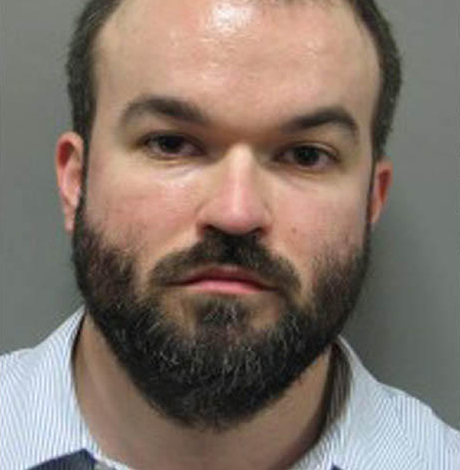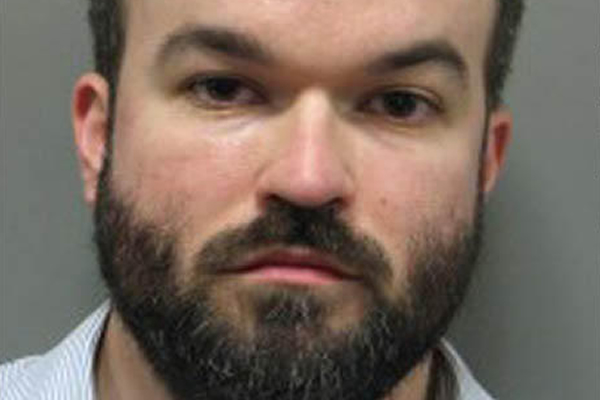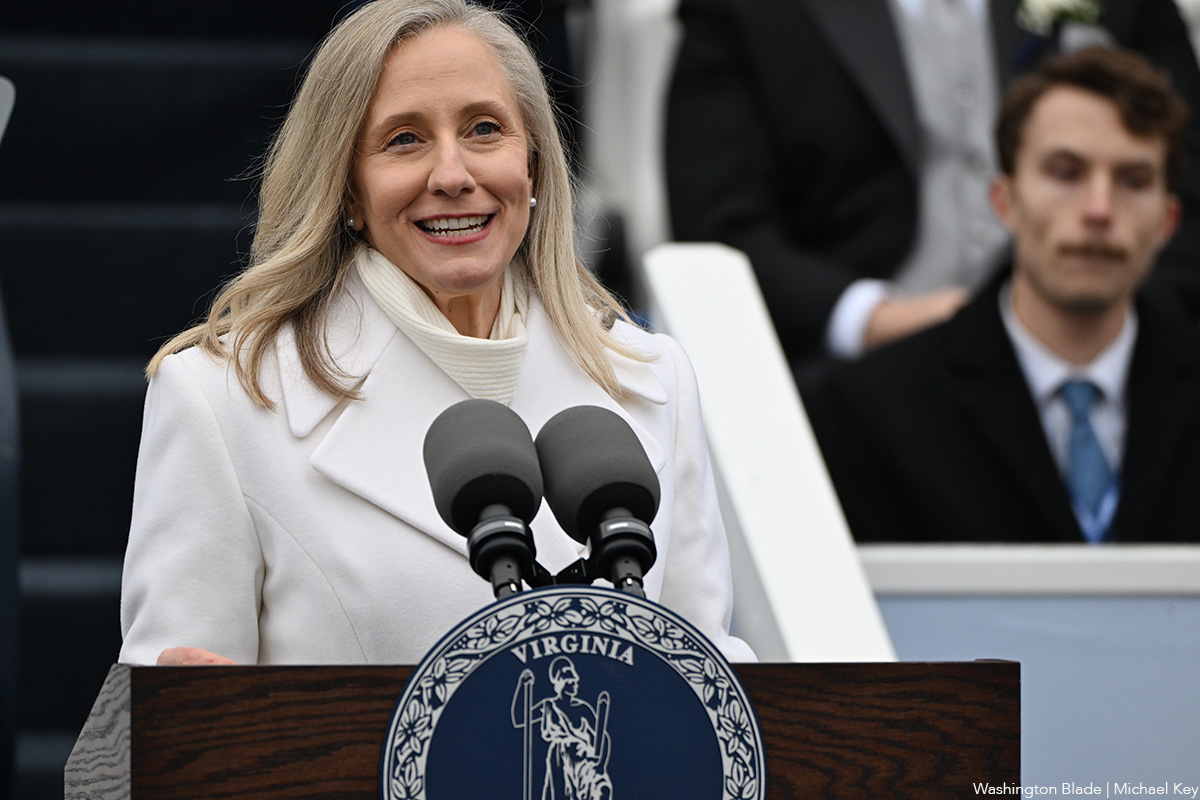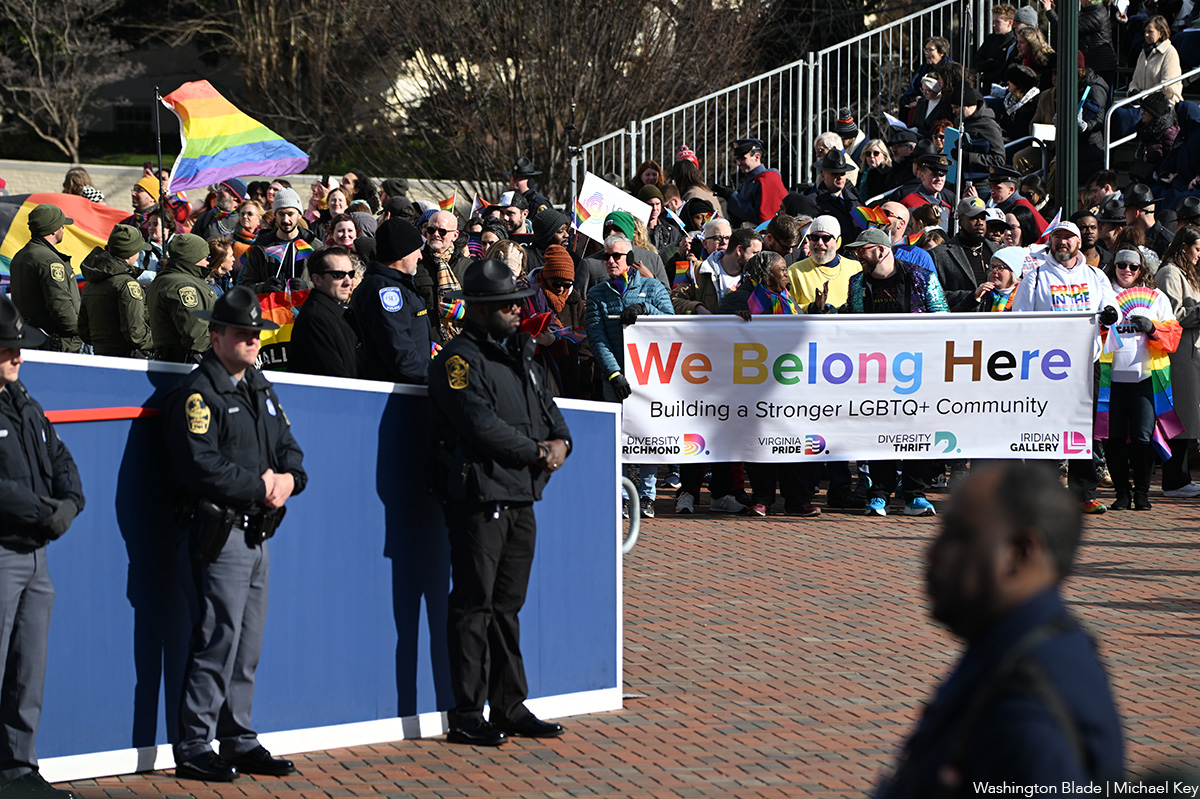Local
Md. police sting operation targeted Grindr
Local man convicted of soliciting sex from 15-year-old


Daniel Read
A Montgomery County Circuit Court judge on June 29 found a 31-year-old man guilty of soliciting sex from a 15-year-old fictional boy created by an undercover police detective who posted messages on the gay app Grindr under the name “Kinky Twinkie.”
The guilty verdict handed down for Germantown resident Daniel Read followed a one-day non-jury trial in which information surfaced that the undercover officer initially created a Grindr profile for Kinky Twinkie as a 17-year-old male high school student.
The legal age of consent in Maryland is 16.
At the time of his arrest in December, Read served as a Montgomery County District Court commissioner, a position that involves performing some of the duties of a judge, including setting bail for prisoners. He was dismissed from his job shortly after his arrest.
A police charging document filed in court says that under the profile of “Dan,” Read began to communicate with the detective posing as the student through text messages and private messages on Grindr.
“During these messages your affiant advised Dan that he (Kinky Twinky) was actually 15 years old,” the charging document says. After several additional exchanges of messages, Dan allegedly asked the student to send him nude photos of himself.
“By utilizing open source libraries, your affiant was able to obtain images to send to Dan as he requested,” says the charging document, which was prepared by the arresting officer, who is identified on the document as Det. Nick Jerman.
The document says Read eventually told the fictional student through a text message that he wanted to have sexual intercourse with him and agreed to meet him at a McDonald’s restaurant in Germantown.
According to the charging document, police officers intercepted Read in his car and arrested him on a charge of sexual solicitation of a minor as he approached the McDonald’s. It says Read had given the undercover officer posing as the student his cell phone number during a prior communication.
Police used the number to trace Read’s identity and home address. At some point before the arrest, police visited the street where Read lived and saw his car, which enabled them to recognize the car when Read drove to the McDonald’s.
“Yesterday’s verdict is clear,” said Ramon Korionoff, a spokesperson for the Montgomery County State’s Attorney’s Office, which prosecuted the case. “Do not seek out sex with a minor. Do not use social media to lure underage boys for a sexual encounter,” Korionoff said.
“The underage person you may be ‘chatting with’ might just be an undercover police officer,” he said. “Daniel Read used poor judgment and committed a criminal offense. He will be held accountable for his crime.”
Under Maryland law Read faces a sentence of up to 10 years in prison and possible placement on a sex offender registry. He is scheduled to be sentenced by Circuit Court Judge Sharon Burrell on Aug. 15.
Read’s attorney, David Moyse, said Read’s arrest took place 30 days after he and the undercover officer began communicating with each other on Grindr and after Read developed what the attorney said was an emotional bond with what he thought was a confused young man who he wanted to help.
“And the real truth is he was targeted, and for 30 days was speaking with this young man thinking that they had a real relationship,” Moyse said. “And Mr. Read identified with the idea of a sexually confused or in-the-closet 15-year-old who was being raised Catholic just like Mr. Read and who described himself as not understood by friends and family or his religion.”
According to Moyse, although Burrell said in her verdict that Read’s actions met the criteria of sexual solicitation of a minor she also found that he was “emotionally induced” to create a relationship with the fictitious student.
“They preyed on a lot of issues that Mr. Read dealt with in his own adolescence to create that bond,” said Moyse. “And in the very end they used jealousy to get him to go over the edge.”
Moyse said transcripts of hundreds of text messages between Read and the detective posing as the student, which were introduced as evidence at the trial, show that the detective repeatedly raised the issue of sex and made it clear that he wanted to have sex with Read.
“Mr. Read kept saying, look, wait until you’re 16 and it’s legal and then we’ll meet,” Moyse quoted Read as saying. “After 30 days the officer said you know what? You’re Mr. Right but I need Mr. Right Now,” Moyse recounted.
“And he went back on Grindr presumably to find another guy,” said Moyse. “And Daniel was so jealous he said fine, let’s fuck.”
It was at that point, Moyse said, that police and prosecutors determined Read crossed the line and violated the statute prohibiting sexual solicitation of a minor.
“To be very fair, they had prior conversations from Mr. Read with other people where he expressed interest in 15-year old boys and 14-year-old boys,” Moyse said. “These were all kind of internet talk. It wasn’t with actual 15-year-olds. But the judge found that he still had the desire, the predisposition to do this,” said Moyse.
“That’s why it’s not entrapment,” he said, as defined and interpreted under the law.
Moyse said he has made a request with the judge to have the sentencing postponed to allow Read to be further evaluated by a mental health professional who will prepare a pre-sentencing report for the judge.

Abigail Spanberger was sworn in as the 75th governor of Virginia at a ceremony on the grounds of the Virginia State Capitol on Saturday. Thousands of spectators watched the swearing-in ceremony and parade, despite the rain and temperatures in the low 40s.
Spanberger, a member of the Democratic Party and an LGBTQ ally, became the first woman to be Virginia’s governor.
View on Threads
Newly-elected Attorney General Jay Jones, Lt. Gov. Ghazala Hashmi, and Spanberger were each administered the oath of office in the public ceremony.

Republican former Gov. Glenn Youngkin left the ceremony shortly after the oath of office was administered to Spanberger and before the inaugural address.
In her speech, the new governor made an appeal to bipartisanship and looking past division in our current moment.
“To my friends in the General Assembly — on both sides of the aisle — I look forward to working with you,” said Spanberger. “I know what it means to represent your constituents, to work hard for your district, and to pursue policies you believe in. We will not agree on everything, but I speak from personal experience when I say that we do not have to see eye-to-eye on every issue in order to stand shoulder-to-shoulder on others.”
Spanberger acknowledged Virginians’ frustrations with federal layoffs and governmental policy.
“I know many of you are worried about the recklessness coming out of Washington. You are worried about policies that are hurting our communities — cutting healthcare access, imperiling rural hospitals, and driving up costs,” said Spanberger. “You are worried about Washington policies that are closing off markets, hurting innovation and private industry, and attacking those who have devoted their lives to public service.”
Spanberger alluded to the Trump-Vance administration, though never mentioned President Donald Trump’s name in her remarks.
Spanberger said, “you are worried about an administration that is gilding buildings while schools crumble, breaking the social safety net, and sowing fear across our communities, betraying the values of who we are as Americans, the very values we celebrate here on these steps.”
The new governor then spoke of her priorities in office, pledging to tackle housing affordability by working to “cut red tape” and increase housing supply. Spanberger also spoke of forestalling an impending healthcare crisis by protecting access and cracking down on “middlemen who are driving up drug prices.”
Spanberger spoke of investments in education at every level, standing up for workers (including the large number of federal workers in Virginia), and taking action on gun violence.
Virginia married couple Mary Townley and Carol Schall witnessed the inauguration ceremony from the stands set up on the grounds of the Capitol. Schall and Townley are one of the plaintiff couples in the case that challenged the Virginia constitutional ban on same-sex marriage.
Same-sex marriage became legal in Virginia in 2014.
“We are delighted with the inauguration of Abigail Spanberger as governor of Virginia,” Schall told the Washington Blade. “The celebration of her inauguration was full of the beautiful diversity that is Virginia. The Virginia Pride contingent was included as a part of what makes Virginia a great place to live.”
“Such an honor to attend such a wonderful event in Virginia history,” Townley told the Blade. “The weather before the Inauguration was cold and rainy, but I believe it represented the end of a dreary time and it ushered in the dry and sunny weather by the end of the inaugural parade. Madam Governor brought us to the light!”
The inaugural parade following the governor’s remarks included a contingent from Diversity Richmond and Virginia Pride. Marchers in the LGBTQ contingent carried a giant Progress Pride flag and were met with loud cheers from the gathered spectators.

Spanberger after her inauguration signed 10 executive orders. One of them bans discrimination against state employees based on sexual orientation, gender identity, and other factors.
“By virtue of the authority vested in me as Governor under Article V of the Constitution of
Virginia, I hereby declare that it is the firm and unwavering policy of the Commonwealth of Virginia to ensure equal opportunity in all facets of state government,” reads the executive order. “The foundational tenet of this executive order is premised upon a steadfast commitment to foster a culture of inclusion, diversity, and mutual respect for all Virginians.”
Virginia
VIDEO: LGBTQ groups march in Va. inaugural parade
Abigail Spanberger took office on Saturday

The inaugural ceremonies for Virginia Gov. Abigail Spanberger were held in Richmond, Va. on Saturday. Among the groups marching in the parade were Diversity Richmond and the Virginia Pride project of Diversity Richmond.
View on Threads

Virginia
Va. Senate approves referendum to repeal marriage amendment
Outgoing state Sen. Adam Ebbin introduced SJ3

The Virginia Senate on Friday by a 26-13 vote margin approved a resolution that seeks to repeal a state constitutional amendment that defines marriage as between a man and a woman.
Outgoing state Sen. Adam Ebbin (D-Alexandria) introduced SJ3. The Senate Privileges and Elections Committee on Wednesday approved it by a 10-4 vote margin.
Same-sex couples have been able to legally marry in Virginia since 2014. Outgoing Republican Gov. Glenn Youngkin in 2024 signed a bill that codified marriage equality in state law.
A resolution that seeks to repeal the Marshall-Newman Amendment passed in the General Assembly in 2021. The resolution passed again in 2025.
Two successive legislatures must approve the resolution before it can go to the ballot. Democrats in the Virginia House of Delegates have said the resolution’s passage is among their 2026 legislative priorities.
“It’s time for Virginia’s Constitution to reflect the law of the land and the values of today,” said Ebbin after Friday’s vote. “This amendment, if approved by voters, would affirm the dignity of all committed couples and protects marriage equality for future generations.”
-

 Iran5 days ago
Iran5 days agoGrenell: ‘Real hope’ for gay rights in Iran as result of nationwide protests
-

 Congress5 days ago
Congress5 days agoVan Hollen speaks at ‘ICE Out for Good’ protest in D.C.
-

 LGBTQ Non-Profit Organizations5 days ago
LGBTQ Non-Profit Organizations5 days agoNational LGBTQ Task Force brings Creating Change conference back to D.C.
-

 Virginia5 days ago
Virginia5 days agoMark Levine loses race to succeed Adam Ebbin in ‘firehouse’ Democratic primary


















